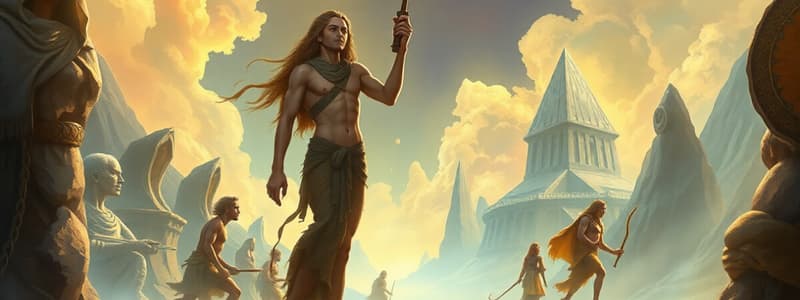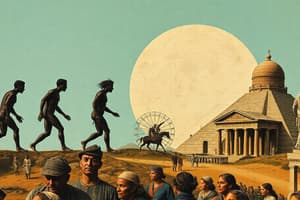Podcast
Questions and Answers
Which of the following milestones is considered a key development in early human history?
Which of the following milestones is considered a key development in early human history?
- Bipedalism (correct)
- Use of complex grammar
- Agricultural advancements
- Invention of currency
What played a significant role in shaping early civilizations?
What played a significant role in shaping early civilizations?
- Religious beliefs and practices (correct)
- Lack of writing systems
- Technological stagnation
- Isolation from other cultures
Flashcards
Early Human Evolution
Early Human Evolution
Humans evolved from earlier primates over millions of years, with key developments like bipedalism and tool use.
Ancient River Valley Civilizations
Ancient River Valley Civilizations
Early civilizations like Mesopotamia and Egypt arose near rivers, developing agriculture, writing and governance.
Classical Greek and Roman Influence
Classical Greek and Roman Influence
Greek philosophy (Socrates, Plato, Aristotle) and Roman law/engineering profoundly impacted Western civilization.
Medieval Feudalism
Medieval Feudalism
Signup and view all the flashcards
Renaissance and Exploration
Renaissance and Exploration
Signup and view all the flashcards
Study Notes
Early Human History
- Humans evolved from earlier primates, a process spanning millions of years.
- Key milestones include bipedalism, tool use, and the development of complex societies.
- Archaeological evidence provides insights into early human diets, shelters, and social structures.
Ancient Civilizations
- Early civilizations emerged in various parts of the world, often concentrated near rivers.
- Examples include Mesopotamia, Egypt, the Indus Valley, and ancient China.
- These civilizations developed complex systems of writing, agriculture, and governance.
- Innovations in architecture, art, and technology emerged, influencing subsequent cultures.
- Religious beliefs and practices played a significant role in shaping these societies.
Classical Antiquity
- Greek and Roman civilizations flourished, emphasizing philosophy, democracy, and law.
- Greek philosophy profoundly affected Western thought, with figures like Socrates, Plato, and Aristotle.
- Roman law and engineering influenced legal systems and infrastructure in later centuries.
- The spread of Greek and Roman culture through conquest and trade significantly influenced the Mediterranean world.
- Significant military and political structures were established.
Medieval Period
- The medieval period saw the rise of feudalism, particularly in Europe.
- This system structured social and economic relations among various classes.
- The Catholic Church exerted significant influence throughout Europe.
- Major events such as the Crusades and the Black Death shaped the course of medieval history.
- Technological advancements occurred, such as the invention of the printing press.
Early Modern Period
- The Renaissance marked a renewed interest in classical learning and arts.
- The Age of Exploration saw European voyages to new lands and the expansion of empires.
- The Scientific Revolution challenged traditional views of the world, leading to advancements in science.
- The Protestant Reformation challenged the authority of the Catholic Church, leading to religious conflicts and transformations.
- Political entities and their power structures continued to evolve.
Modern Era
- The Enlightenment emphasized reason and individual rights.
- Industrialization transformed societies and economies.
- Major wars, such as World War I and World War II, significantly impacted the world.
- Nationalism and political ideologies emerged and played a key role in shaping societies.
- Advances in technology and communication dramatically altered global interactions.
Contemporary Period
- Globalization and interconnectedness are defining features of the contemporary world.
- Environmental concerns and sustainability have emerged as major issues.
- Ethnic and cultural diversity has become more pronounced globally.
- International organizations and institutions play an increasing role in global affairs.
- There is ongoing debate about the role of technology in society and the future of human civilization.
Studying That Suits You
Use AI to generate personalized quizzes and flashcards to suit your learning preferences.
Description
Explore the journey of human evolution from primates to the establishment of early civilizations. This quiz covers significant milestones in human history, the development of complex societies, and the innovations that arose in ancient cultures such as Mesopotamia and Greece. Test your knowledge on the impact these early societies had on modern civilization.




